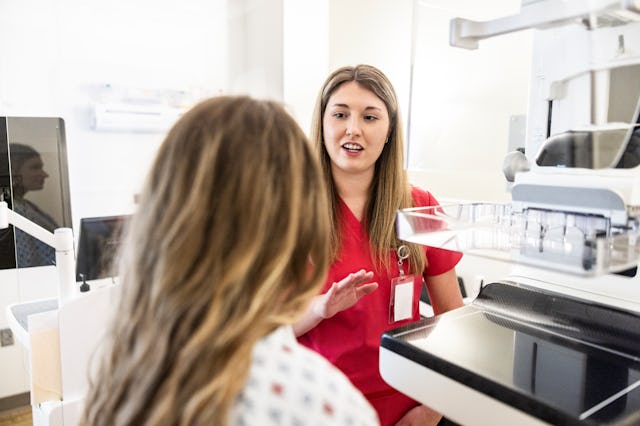A New Study Highlights How Crucial It Is To Attend Your First Mammogram
It’s a good reminder to prioritize your screenings.

We all know mammograms are important, just like all the other routine screenings we’re supposed to do — from those biannual teeth cleanings to pap smears and just regular old physicals once a year. But when you’re a busy mom with kids and a job and maybe even a hobby or two, well, time is hard to come by, and it’s easy to push off our health appointments until later “when we have time.” But a new study of more than 430,000 women in Sweden has revealed just how important it is to attend your first mammogram on time.
The American Cancer Society recommends that women have their first mammogram between the ages of 40 and 44, and by the age of 45, they should be getting one annually. Those who are 55 and older can switch to getting a mammogram every other year if they choose. Women who have a higher than average breast cancer risk should begin getting a mammogram and breast MRI each year starting at age 30. (As of 2023, the American College of Radiology includes Black women in the high-risk population, so be sure to mention this to your provider if they don’t bring it up to you.)
So, what did this new study have to say?
The study tracked a large population of women over the course of 25 years. Of those who were referred for their first screening mammogram, one-third opted out. Among these nonparticipants, there was a tendency to skip other future mammograms and the group was overall more likely to have breast cancer diagnosed in advanced stages — a 1.5 times greater chance of having stage 3, and 3.6 times greater chance of having stage 4, to be exact — compared to women who did attend their first mammogram on time.
But why does missing one initial screening lead to all this added risk? Well, it’s moreso just an early indicator that the women in question may not go (or be able to go) to their routine screenings over time, which of course increases their risk. The researchers behind the study say that their goal was to determine “if early screening behaviour is predictive of later stage diagnosis and mortality risk,” and to show that it’s worthwhile for doctors to intervene early if they know their patients are not doing recommended screenings.
“I think the key is that the initial nonparticipants were also more likely to persistently miss subsequent follow-up screening exams,” said Dr. Leana Wen, an emergency physician and adjunct associate professor at George Washington University, to CNN. “The reasons for this are likely complicated and could be a combination of factors, including lack of awareness, barriers to access, and fear of finding out the result. Cultural factors may also be at play. The result is that these individuals were more likely to have their cancers diagnosed at a later stage, when survival rates are lower, and therefore tragically ended up having more deaths from their cancers.”
Why It Matters To Get Your First Mammogram At 40
There are good reasons why medical authorities say certain screenings need to begin at certain ages. Last year, the U.S. Preventive Services Task Force recommended that most women receive a yearly mammogram starting at age 40, rather than every two years beginning at age 50. The new recommendations matched what the American Cancer Society had been promoting for years prior.
The shift is intended to save lives and catch cancer before it can progress into the later stages. As CNN reported, breast cancer is the most common cancer and the leading cause of cancer death in women ages 20 to 49, and “younger women tend to have more aggressive cancers upon diagnosis compared to older women. Treating advanced cancers is often more invasive surgically and can require more intense chemotherapy and radiation, but early detection has been shown to save lives and improve patients’ outcomes.
So if you’ve been putting off getting that first mammo — we know, they’re the pits — remember it’s not just an annoying task to check off a list in your already full calendar. Think of this as an hour you’re spending now to ensure you have more healthy, happy hours in the future.